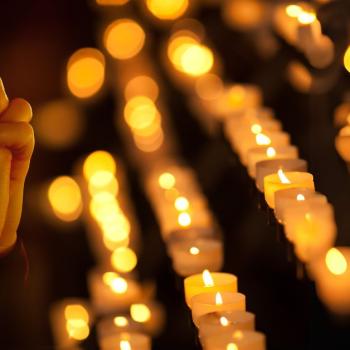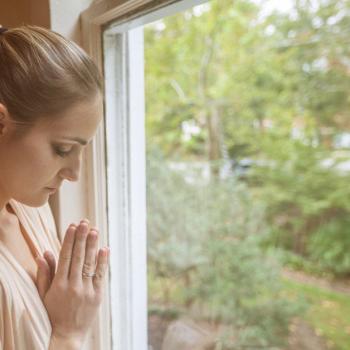This is a post which is likely, due to its subject matter, to be of interest to only a small segment of my readers, but I’ll try to make this more broadly interesting (since, after all, one of my stated reasons for blogging is to practice at writing things that are interesting to other people rather than just myself). In any event, it’s a long one, so please bear with me. . .
Elizabeth Scalia, “The Anchoress” at Patheos, wrote about and linked to an article about a female “priest” in Austria. So I’ll start with her comments, then go to the article itself, then my thoughts on the whole issue.
Here’s what jumped out at me:
“I had felt called by God to priesthood since I was a small child,” she says simply, “and I wanted to be a priest before I died.”
That’s four I’s in two sentences, and not a “Jesus” in sight, in the whole long piece, except as necessary to provide the vaguest of explanations for our teaching on ordination.
. . . There is a great deal of pride and self-reference in all of this. Beyond that, the idea that “I felt called and wanted this before I died, because I am a prophet” makes her theology terribly suspect.
She calls herself “a prophet” but prophets generally don’t want any part of whatever it is they’re being called to. If they eventually find joy in their obedience, their first response is usually, “oh, hell no.”
Theologically, she is missing the whole idea — the Christ-promulgated idea — that you can’t always get what you want, but (if you try sometimes, though obedience is hard) you get what you need.
Now, the article itself, “Meet the female priest defying Catholicism for her faith,” in the Telegraph. It profiles an Austrian woman, Christine Mayr-Lumetzberger, a 58-year-old ex-nun who, in 2002, was “ordained” by an Argentinian Catholic bishop, Antonio Braschi, was subsequently excommunicated, and followed that up by being “consecrated” a bishop by multiple rebellious anonymous bishops. Since then,
On her laptop – decorated with a red rose – “Mrs Bishop” has file after file of pictures of herself, in full episcopal robes, performing baptisms, marriages and funerals in Catholic churches up and down Austria – and beyond. She’s being doing one every two weeks for the past decade, she estimates. In the snaps, she’s there on the altar at Kremsmunster, the oldest Benedictine monastery in Austria, with the congregation spread out in front of her. Or leading a long funeral procession side-by-side into another church with a male priest.
So they accept her as one of them? “Yes.” And suffer no consequences from their bishops for sharing their pulpits an excommunicated woman? “No, never once.”
Her backstory: she was a nun briefly, from 1970 to 1975, out of a belief that “by signing on as a nun, she was putting herself at the front of the queue when women’s ordination finally was permitted.” After she left, she taught religious education until she married a divorced man (“he had already left his wife” she says in her own defense, that is, asserting that she wasn’t a home-wrecker) and became ineligible, but continued to believe she was called to be a priest.
And why do people turn to her for these rites? She says,
Some people want a woman priest because they believe we offer different things, that we can feel with them in a different way, that we can be easier with them than a man, that we can, for example, hold a grieving mother in a way that a male priest cannot.
So the first question is, what is going on in the church in Austria?
There is a group called Call to Disobedience, founded in 2006, which claims to have the support of the majority of Austrian priests, which advocates for female priests and married priests, opposes the teaching on the indissolubility of marriage, and, according to Wikipedia, disagrees with church doctrine in other, nonspecified ways. Here’s their website, in German. Phrasing their goals in part as a response to declining numbers of priests and increasing numbers of priest-less or closed churches, they say, “WIR WERDEN deshalb jede Gelegenheit nützen, uns öffentlich für die Zulassung von Frauen und Verheirateten zum Priesteramt auszusprechen. Wir sehen in ihnen willkommene Kolleginnen und Kollegen im Amt der Seelsorge,” which means, basically, we will take every opportunity to address the admission of women and married people to the priesthood. We view them as welcome colleagues in the care of souls.”
So to the extent that they are, presumably not a majority, but a significant minority, I suppose it’s not a surprise that they would welcome a freelance female “priest.”
Why do these individuals not just simply leave the Roman Catholic church for a denomination that’s more to their liking? In part, because Catholicism is the only game in town in Austria. As recently as 1951, 89% of Austrians were Catholic, with most of the remainder Lutheran (6%). Now the percent of Catholics has dropped to 62%, but, so, too, the % Lutheran is now less than 4%, and the remainder are Muslim or Orthodox (due to immigration from the East and from Turkey) or Nones (now 19%).
Functionally, the Catholic Church seems to be viewed as the State church, with the consequence that people expect it to be a pretty big tent, and accommodate every desire. (Though perhaps it’s not as far gone as the actual state church in Sweden, where (I can’t find the link just now) confirmation is a coming-of-age ritual which is openly open to all teenagers without any requirement of affirming belief in church doctrine and, not long ago, a pastor announced his atheism and, after a lengthy church “trial,” succeeded in keeping his job.)
Nonetheless, the notion of a woman deciding to seek ordination from someone willing to violate all the rules to do so, and freelance her way around, is actually not unfamiliar to me: an old friend from grad school, who I’d lost touch with afterwards, followed exactly this path. She was a doctoral student in Theology when I first met her, having initially gotten her master’s degree, then left to work at a pregnancy counseling center, and then returned. She was working on her dissertation when I got married and moved to Chicago; shortly afterwards she got a teaching position, during which time she was supposed to be working on her dissertation, but she ended up writing a never-published memoir (about, she told me, her grieving for her daughter, who died as a toddler in a car accident), and concluded at the end of this project that it was her destiny to be ordained. So — her husband having lost patience with the fact that he took a part-time job to take on the primary responsibility for caring for their newborn, in order for her to teach and write the dissertation, which she didn’t do, and since she decided that she didn’t like that teaching job, anyway, they packed up and left, he got a regular full-time job, and she started putting in her time as Episcopalian, because she learned that she needed to, in fact, have been an Episcopalian for a certain length of time before applying for the seminary.
Anyway — it was about this time that I lost touch with her. Quite some time later, I found her, through the magic of the internet. By this time, she had moved two more times, had given up on the Episcopalians (I don’t remember if it was because she lost patience with their requirements for the seminary and was unhappy that they didn’t give her enough “credit” for what she’d done, or if they lost patience with her), and had gotten herself a mail-order ordination and hung her shingle as a wedding officiant. She had finally finished her dissertation, had another child, taught intermittently, moved a couple more times, and got herself ordained by an Old Catholic group, which meant that she began to call herself a Roman Catholic priest. She then decided that no splinter-Catholic group was sufficiently feminist, so she got someone to ordain her a “bishop” and claimed to found a Catholic group of her own to emphasize feminism and “Goddess spirituality.” And now (I was her facebook friend for a while until she unfriended me but we have mutual friends so I can check in on her to a certain degree due to her privacy settings) she’s trying to get a teaching job again while lamenting that she had to lose her academic career to “answer her call to priesthood,” and in the meantime freelances as a “spiritual director.”
So I tend to react to these sorts of stories by thinking about this friend, who has changed course so frequently that she’d have made a really lousy priest even if she’d been in a denomination with female clergy, and for whom the ordination was a “thing” that she wanted and a career path she desired, rather than a call to serve in a community, and I’m highly skeptical of any of these stories of women who decide on their own to seek “illegal” ordination and pursue ministry as a freelance occupation.
But here’s the thing:
Priesthood, for Catholics, is different than becoming a pastor, for Protestants. It’s connected in with the sacraments: a deacon can officiate at weddings and perform baptisms, a priest can consecrate the Eucharist and administer the sacraments of reconciliation (confession) and Anointing of the Sick, and a bishop can ordain new priests.
And one of the key elements of Catholicism that differentiate it from Protestantism is the emphasis on sacraments, and the fundamental idea that God uses physical objects to provide sacramental grace: water for baptism, bread and wine for the Eucharist, oil for Anointing. And there is a certain amount of arbitrariness to it: may a Chinese Catholic church substitute rice and tea? No. You can’t even swap out grape juice for the wine, though for alcoholics a special “wine” is available with no detectable amount of alcohol (I was once at a church where, in the sacristy where people ordinarily wouldn’t see it, there was a note about special wine for Father so-and-so, which I presumed meant that he was a recovering alcoholic), and gluten-free wafers don’t count as “real bread,” but there are alternatives with miniscule amounts of gluten available upon request. So, whether you believe it or not, it’s not unreasonable for theologians to believe that one of the key “ingredients” at the consecration of the Eucharist be that the presider be male as Christ was.
But at the same time, women, and lay men as well, are taking on more roles in parishes. Professionally, there are more women who are “Pastoral Associates,” which means that they do a mix of the pastoral and administrative work that happens at a church, similar to what an actual pastor/priest does. Other women, when married to a deacon, are active in many of the same ministries, and, in fact, often take the same night classes as their husbands do. Still others preside at communion services (that is, church services without consecration of the Eucharist, held, for instance, at my church, in the early morning on weekdays), or lead Bible studies or adult education classes, or prepare new parents for baptism or couples for marriage. Lay men or women may be “youth ministry directors,” a position often held by an actual ordained minister in many Protestant churches.
What is missing in the Catholic Church, and could be a real benefit, is a “Protestant-style” ordination — that is, a means of formally recognizing and commissioning both men and women who serve in these non-sacramental ministry roles. I used to wonder if my friend, had such a recognition been available to her, wouldn’t have headed down this alternate path (in the meantime, I concluded that she’s flaky enough that it wouldn’t have made a difference).
And at the same time — to go back to this Austrian woman’s comment:
Some people want a woman priest because they believe we offer different things, that we can feel with them in a different way, that we can be easier with them than a man, that we can, for example, hold a grieving mother in a way that a male priest cannot.
I have read that, as mainline Protestant denominations have opened up ordination to women, that they are essentially replacing men. I’ve been taking enough time writing this now that I can’t start digging for statistics, but perhaps another time I’ll try to dig around to see what there is on the question of whether men and women minister “differently” and whether men’s days are numbered as pastors, in churches with ordination of women, in the same way as women, in general, tend to me more likely to attend and be involved in church. It reminds to a certain degree, too, of men OB/GYNs, and an article that their ranks are diminishing (even though a male OB/gyn doesn’t bother me, and I tended to make an appointment with one of the men in the practice because there were more available appointment times, and they always maintained a careful professionalism). I have the impression, though, that this woman’s statement, and the general expectation that woman pastors will be more “nurturing” with their congregants, will, in the long term, have a significant impact on what it means to be a church and to minister.
So there you have it. A lot of rambling with one bottom-line thought and a further open question.















